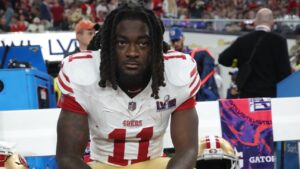The hatred is getting to the point that I will have no choice but to leave.” WR Brandon Aiyuk cries out in response to an abrupt…

In a recent press conference, San Francisco 49ers wide receiver Brandon Aiyuk expressed his deep frustration and concern regarding the growing negativity surrounding him and the team. “The hatred is getting to the point that I will have no choice but to leave,” he stated, his voice tinged with emotion. This candid admission struck a chord with fans and analysts alike, sparking conversations about the pressures athletes face in the modern sports landscape.
Aiyuk’s comments come amid a challenging season for the 49ers, where high expectations have clashed with inconsistent performances. The team, known for its storied history and passionate fanbase, has not been immune to the scrutiny that often comes with professional sports. Aiyuk, a talented receiver with a promising career ahead of him, has found himself in the crosshairs of critics who have been quick to assign blame for the team’s struggles.
In the age of social media, athletes are often subjected to instant feedback, both positive and negative. Aiyuk’s remarks highlight a darker side of this phenomenon: the pervasive negativity that can seep into an athlete’s mental and emotional well-being. Fans, eager to see their team succeed, sometimes forget the human aspect of those they cheer for. Aiyuk’s struggles on the field have led to a wave of criticism that, according to him, has become unbearable.
“I understand the passion of our fans,” Aiyuk said, “but when it turns into hatred, it’s hard to navigate. I want to be the best I can be for this team, but I also have to protect my mental health.” This sentiment is increasingly echoed among professional athletes, who are advocating for a healthier dialogue between players and fans.
Aiyuk’s situation raises broader questions about the culture surrounding sports. When does passion cross the line into toxicity? How can fans support their teams while respecting the individuals who make up those teams? Aiyuk’s call for a more compassionate understanding is a reminder that behind the stats and game-day performances are real people facing real challenges.
As the season progresses, the hope is that both Aiyuk and the 49ers can find a way to channel this negativity into motivation and resilience. For Aiyuk, stepping away from the noise might be necessary to refocus and rediscover his love for the game. Ultimately, it’s a plea for kindness—a reminder that every player deserves respect, even in the heat of competition.

Leave a Reply